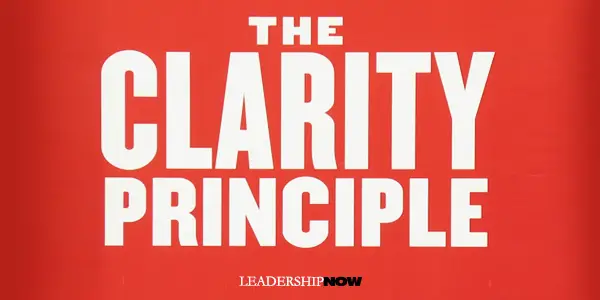 |
 |
06.05.13

The Clarity Principle The Clarity Principle by Chatham Sullivan, is about a widespread issue facing many (most) organizations: who are we and what are we doing? What is our purpose? It is a vitally important question that is rarely answered—not really. It's a difficult question to answer and is the cause of much of the dysfunctional, painful and absurd activity in many organizations. Instead of leading we are being lead by the business we are supposed to be leading.
The Clarity Principle by Chatham Sullivan, is about a widespread issue facing many (most) organizations: who are we and what are we doing? What is our purpose? It is a vitally important question that is rarely answered—not really. It's a difficult question to answer and is the cause of much of the dysfunctional, painful and absurd activity in many organizations. Instead of leading we are being lead by the business we are supposed to be leading.
The Clarity Principle states that clarity is derived from purpose, and purpose from a pivotal act of choice that leaders make about the business. Sullivan says that the problem isn't that organizations define themselves incorrectly, it's that they don't choose at all. Choosing "is a risky prospect, fraught with personal, political, and cultural risks for the organization and its leaders." Leaders often "duck their responsibility for choosing because they cannot accept the tradeoffs, risk, and loss that accompany an act of commitment to choose one definition of the business over the other." A purpose is not necessarily set in stone especially in today's business climate. "Companies do and should reinvent themselves. But there is a big difference between redefining your purpose and attempting to stitch together conflicting business models." He adds, "attempting to simultaneously preserve and replace the core is very likely a fool's errand. There is only so much artful balancing a company can endure. The goal of achieving balance between contradictory models often becomes the biggest excuse for failing to make the bigger choice." We may avoid the choice out of a desire to protect the organization and its people—to maintain a perceived stability and collegiality. To address one choice over the other would disrupt the way in which people have become used to operating. But in the long run, this silence will end up hurting the organization. Sullivan writes that "Leadership's primary responsibility is to define the purpose of the business. This means understanding and making choices to resolve strategic dilemmas confronting the organization." We see dysfunctions in the business not merely as "people problems" but as upwelling expressions of larger foundational business dilemmas. Thus what may at first appear to be a turf battle between two departments is really descended from a persistent failure to clarify the company's purpose or a painful fight with a coworker is less a personal failure or conflict of styles than evidence of an important strategic dilemma.Corporate life so often disappoints writes Sullivan, because "the loss of shared purpose makes the experience of business feel as though it's every man or woman for him- or herself. People who feel disconnected from the primary task of the business become isolated from one another." Sullivan provides numerous examples of conversations that have gone on inside companies in search of their purpose. Their struggles can be quite enlightening and helpful in determining our own. What if you're not the CEO? Take responsibility for those things within your ability to control. Acts of small leadership can thus have outsized impact. They perform the role of making monumental undertakings more easily achievable. In truth, you don't have to be a top executive to resist, confront, and even reverse the contagious effects of a crisis. If the conflicts in the business can flow down from on high, generating breakdowns throughout the organization, so too can creative solutions and purposeful action flow upward to help resolve the crisis. What you can do:
The issues addressed in this book will resonate with most of us. "The battle against ambiguity is never-ending," says Sullivan. Choice defines and establishes that some things are more crucial than others. It's the leader's job.

Posted by Michael McKinney at 11:36 PM
|
BUILD YOUR KNOWLEDGE
 

How to Do Your Start-Up Right STRAIGHT TALK FOR START-UPS 
Grow Your Leadership Skills NEW AND UPCOMING LEADERSHIP BOOKS 
Leadership Minute BITE-SIZE CONCEPTS YOU CAN CHEW ON 
Classic Leadership Books BOOKS TO READ BEFORE YOU LEAD |